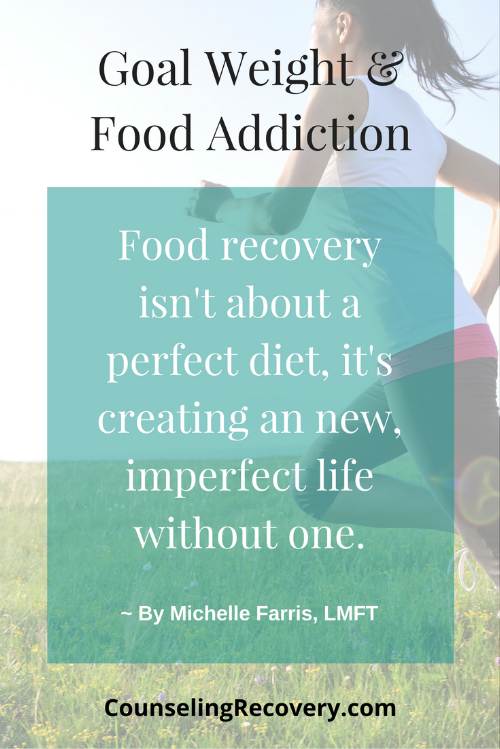Goal Weight & Food Addiction
Struggling with self-esteem and body image are both important signs of food addiction. And it starts early. The National Eating Disorders Association reports that 40-60% of elementary school age girls are concerned about their weight and becoming fat.
But it's not just about the weight. It's about a lot more.
I've met gorgeous women who were totally obsessed with their weight. It shocked me to hear how unhappy they were with themselves despite looking perfect. Looking good doesn't mean you're happy, or have healthy, fulfilling relationships.
Tips for dealing with food addiction and goal weight
Many women and men have an obsession with weight and food. Overeating, constantly counting calories, eating too little are all indicators.
What is Food Addiction?
Having issues with food and weight are on a continuum like alcohol and drugs. In the beginning, when you start having difficulties with food, you may feel self-conscious about how your clothes fit and what you look like compared to other people. As the obsession gets worse, you feel totally controlled by food and can't think of much else.
A compulsive overeater never feels good enough. Compulsively eating, binge-eating, over-exercising and restricting food intake are ways to escape painful feelings.
When Is it A Food Addiction?
When food becomes an obsession, a person’s friends, family, commitments all take a back seat to food. Just like an alcoholic or drug addict. Same disease, different substance. When these destructive thoughts and behaviors begin to dominate your life it's time to get help.
Feeling fat is just a symptom.
Not feeling good enough is at the core of food addiction. Goal weight is closely tied to a food addict's self worth. A compulsive overeater thinks that having the perfect body means having a perfect life too.
But having a nice body has nothing to do with self love or being happy.
Learning to love yourself is a major goal in recovery. It's not about the number on the scale, it's about accepting yourself, warts and all.
The Hidden Struggle
Most people with food addiction admit that they feel fat but often hide what they eat and how they feel about their bodies. There is still is a lot of stigma attached to food addiction.
It's not a sexy disease. And it's totally different from alcohol. You can't put the plug in the jug and move on. It's been said that food addiction is like bringing the tiger out three times a day. That's tough!
Is food a problem?
Do you spent most of your time thinking about what to eat or how to get it?
Are you obsessed with controlling your food?
Do people say you look great but you still feel fat?
Do you restrict your food beyond the point of threatening your health?
Are relationships uncomfortable for you because you'd rather eat?
Have you tried dieting only to gain even more weight?
Do you think that tomorrow you'll start that diet?
These are all signs of food addiction but with the right support you can recover from compulsive overeating and find peace with your body and the food.
A New Life without Compulsive Eating
Overeaters Anonymous is a 12 step program for food addiction. It's a safe, nonjudgmental place to share what's underneath the food while decreasing the shame that keeps addicts isolated.
They have a saying - weakness not strength binds us together. It is not willpower over food but admitting our powerlessness over it that starts the healing.
Twenty seven years ago I went to my first Overeaters Anonymous meeting. I realized I wasn't alone and that there was a solution and a support that changed my life.
That work led me to becoming a therapist because it taught me the value of growth and that serenity really is possible.
Check out my private resource library with 20 Ways to Detach When You need a Break and 15 Steps to Setting Healthy Boundaries ! Click below to get access now!

